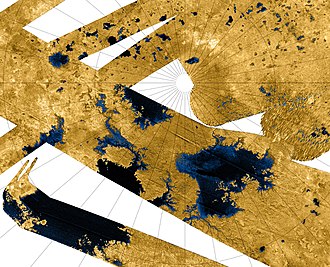
Back افتراضيات الكيمياء الحيوية Arabic Tipus hipotètics de bioquímica Catalan Bioquímicas hipotéticas Spanish Vaihtoehtoinen biokemia Finnish Biochimies hypothétiques French ביוכימיה אלטרנטיבית HE Այլընտրանքային կենսաքիմիա Armenian Biochimiche ipotetiche Italian 代わりの生化学 Japanese 대체생화학 Korean

"The existence of lakes of liquid hydrocarbons on Titan opens up the possibility for solvents and energy sources that are alternatives to those in our biosphere and that might support novel life forms altogether different from those on Earth."—NASA Astrobiology Roadmap 2008[1]
Hypothetical types of biochemistry are forms of biochemistry agreed to be scientifically viable but not proven to exist at this time.[2] The kinds of living organisms currently known on Earth all use carbon compounds for basic structural and metabolic functions, water as a solvent, and DNA or RNA to define and control their form. If life exists on other planets or moons it may be chemically similar, though it is also possible that there are organisms with quite different chemistries[3] – for instance, involving other classes of carbon compounds, compounds of another element, or another solvent in place of water.
The possibility of life-forms being based on "alternative" biochemistries is the topic of an ongoing scientific discussion, informed by what is known about extraterrestrial environments and about the chemical behaviour of various elements and compounds. It is of interest in synthetic biology and is also a common subject in science fiction.
The element silicon has been much discussed as a hypothetical alternative to carbon. Silicon is in the same group as carbon on the periodic table and, like carbon, it is tetravalent. Hypothetical alternatives to water include ammonia, which, like water, is a polar molecule, and cosmically abundant; and non-polar hydrocarbon solvents such as methane and ethane, which are known to exist in liquid form on the surface of Titan.
- ^ David J. Des Marais; et al. (2008). "The NASA Astrobiology Roadmap". Astrobiology. 8 (4): 715–730. Bibcode:2008AsBio...8..715D. doi:10.1089/ast.2008.0819. PMID 18793098. S2CID 18725684.
- ^ Davila, Alfonso F.; McKay, Christopher P. (May 27, 2014). "Chance and Necessity in Biochemistry: Implications for the Search for Extraterrestrial Biomarkers in Earth-like Environments". Astrobiology. 14 (6): 534–540. Bibcode:2014AsBio..14..534D. doi:10.1089/ast.2014.1150. PMC 4060776. PMID 24867145.
- ^ Singer, Emily (July 19, 2015). "Chemists Invent New Letters for Nature's Genetic Alphabet". Wired. Retrieved July 20, 2015.
© MMXXIII Rich X Search. We shall prevail. All rights reserved. Rich X Search